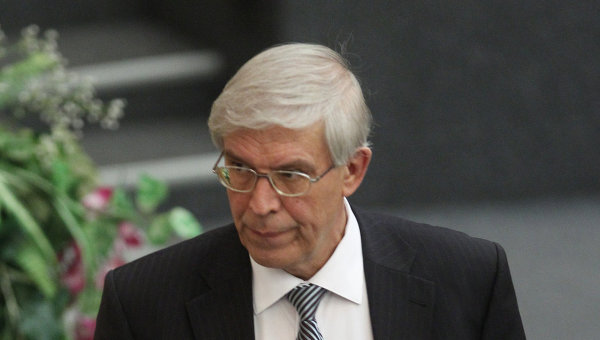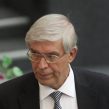
Capital Flight from Russia Tells a Tale About Regime Failure
Publication: Eurasia Daily Monitor Volume: 10 Issue: 35
By:

Last week marked the anniversary of the shocking performance staged by the Pussy Riot punk rock group in the Christ the Savior Cathedral in Moscow. And this year saw a spectacular increase in the density of “patriotic” political noise silencing common sense in debates over such matters as separation of church and state, homosexual “propaganda” or the adoption of Russian children by American families. This noise has obscured one truly sensational news item produced by the Chairman of the Central Bank Sergei Ignatiev who confirmed that Russia, which should have been—and needs to be—a net importer of capital, lost through capital flight $57 billion in 2012, including $35 billion in “dubious operations” (Vedomosti, February 20). There is nothing new about these figures, but Ignatiev asserted that more than a half of the dubious money outflow is controlled by “one well-organized group of people,” which should have been identified and terminated.
This informed estimate provides a rare insight into the maturity of organized crime in Russia and the scope of the country’s corruption. This criminal group necessarily includes not only dirty bankers, who create disposable companies, but also tax authorities, who write down the non-payments, and even the Federal Security Service (FSB), which monitors financial flows (Novaya Gazeta, February 21). The organized crime group in question has built a reputation for reliably servicing the vast “shadow economy” and is well-protected against criminal investigations, so Ignatiev dares to spell out his frustration only because he is due to leave the position he has held for 12 years in a few months (Kommersant-FM, February 20). This invincibility of a flourishing criminal organization sheds new light on the plight of Sergei Magnitsky, who discovered a fragment of its activity and paid with his life for the attempt to stop it (Ezhednevny Zhurnal, February 23). In fact, the hysterical political reaction to every examination of the Magnitsky case in the United States or, more hesitantly, in the European Union can be largely explained by the inability to investigate this crime determined by the unbreakable chain of mutual commitments inside the group of money-exporters (Novaya Gazeta, February 20).
President Vladimir Putin is probably irked and alarmed by the absolute indifference within the corrupt bureaucracy to his supreme orders, and he also begins to suspect that the non-stop parade of raspil and otkat (these expressive terms for embezzlement and bribe have enriched the financial lexicon) threatens the sustainability of Putinism’s economic model. He tries to strike some fear back into the predatory bureaucracy by expressing outrage over the most blatant “privatization” of budgets designated for top-priority projects in Vladivostok, which hosted the Asia-Pacific Economic Cooperation (APEC) summit, and in Sochi, where the Olympic construction has entered its final desperate phase (New Times, February 18). His search for scapegoats remains, however, as unconvincing as is the legislation forbidding top-level bureaucrats the elementary convenience of owning bank accounts abroad (Kommersant, February 22). This “frown on corruption” only further encourages capital flight, which reached $10 billion in January and is no longer officially forecasted to cease, but rather to stay at the level of $50 billion in 2013 (RBC Daily, February 22).
This sustained outpouring of money affects economic growth, which Putin perceives as the crucial condition for stabilizing his suddenly shaky presidency. He has little interest in the services sector and is a firm believer in re-industrialization. But it is exactly the industrial production that registered contraction going into the fifth straight month, so that the output in January 2013 was 0.8 percent lower than in the same month of 2012 (Nezavisimaya Gazeta, February 22). The defense-industrial complex is supposed to be the “locomotive” of growth in manufacturing, but the ambitious re-armament program is advancing well only on paper where target figures are routinely corrected to fit the actual results. The “patriotic” lobbyists have successfully derailed most proposals for importing high-tech weapons from Western producers, popular with former Defense Minister Anatoly Serdyukov. His successor, Sergei Shoigu, prefers to defuse the conflict with the industry but cannot ignore the results of a recent audit, which established that only 20 percent of enterprises could qualify as “modern.” Whereas, in more than half of them modernization makes no sense, so only political orders postpone their overdue shutdown (Ezhednevny Zhurnal, February 22). Putin has committed himself to feeding a “black hole” that aggravates the shortage of investment resources in other sectors (Nezavisimoe Voennoe Obozrenie, February 15).
The squeeze is acutely felt in the oil and gas industry, which was the main provider of prosperity for the petro-addicted country but now is facing technological challenges and saturation on the key export market in Europe, and so contributes to the trend of extra slow growth (Forbes.ru, February 21). Putin’s particular attention to every oil contract and gas deal used to be an attraction for Western investors, who valued his guarantees, but now it is seen as a factor worsening the “Siberian” investment climate. With a wary sense of déjà vu, European consumers follow the current Russian-Ukrainian quarrels as President Viktor Yanukovich refuses to pay the $7 billion fine to Gazprom, speculating that Putin will not risk another “gas war” (Kommersant, February 22). The Russian President is indeed more preoccupied with the fierce court intrigues, suspecting that the government’s forays against his loyal lieutenant Igor Sechin, who fancies himself an “energy tsar,” are merely a means for Prime Minister Dmitry Medvedev to position himself as a smarter economic “modernizer” (Novaya Gazeta, February 22).
Jealously guarding his privilege of economic commander-in-chief, Putin cannot fail to see that his instructions to secure stable growth and to keep the working class employed depart further and further from the reality of inescapable stagnation. The slowdown is not externally-induced or cyclical but determined by escalating bureaucratic predation, which escapes Russia through “dubious operations” that roughly equal what Gazprom earns in net profit. Putin is helpless to curtail the corruption, which is the organizing principle of his system of power and the only guarantee of loyalty of his subordinates. The pivotal institution of the Russian presidency is quickly losing legitimacy—a stronger signal to the elites than any “stay home” order from Putin that it is time to pull their ill-gained fortunes out of the country. The regime’s failure is, therefore, gaining momentum.




